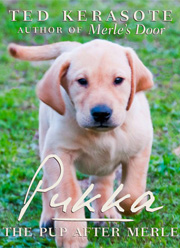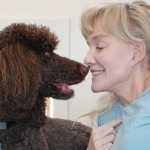Merle of Merle’s Door: Lessons from a Freethinking Dog left some big paws to fill in Ted Kerasote‘s life after he, Merle, died. Pukka, to hear him tell it, is living up to the challenge, and his name helps. Pukka is Hindi for “genuine” or “first class.”
Kerasote writes the story of Pukka: The Pup after Merle in Pukka’s  voice. I’m not a fan of dog stories written in the first person-dog. I generally find the conceit finger-nails-scraping-across-a-chalk-board annoying. I braced myself as I cracked the book open. Once I started reading, though, I didn’t want the book to end. Pukka pulled me right in and left me wanting to know, “What happened next?” I think the reason first-person dog voice worked for me in this book is that it didn’t strike me as being just a literary device, rather it gave this reader insight into Ted’s empathy for Pukka. I liked that.
voice. I’m not a fan of dog stories written in the first person-dog. I generally find the conceit finger-nails-scraping-across-a-chalk-board annoying. I braced myself as I cracked the book open. Once I started reading, though, I didn’t want the book to end. Pukka pulled me right in and left me wanting to know, “What happened next?” I think the reason first-person dog voice worked for me in this book is that it didn’t strike me as being just a literary device, rather it gave this reader insight into Ted’s empathy for Pukka. I liked that.
You don’t need to have read Merle’s Door. Pukka stands on its own. Still for those who have read Merle’s Door, Ted includes a nice transition by providing just enough backstory. He, ah, Pukka, tells us how Ted discovered his mom, Abby, while on a book tour in Minnestoa, and how a year later he returned to the breeder to select Pukka from Abby’s litter.
Pukka is a children’s book with over 200 glorious photographs of Pukka learning the ropes and snuggling up with Ted. But, it’s also a dog-lover’s tale no matter what your age. With the exception of Ted bringing Pukka home at the age of seven weeks, which seems early to me, I found much to admire in their budding relationship. (I would have loved to have asked Ted about the seven weeks when he was in Boulder for a book signing last Monday, November 1. But, I was unfortunately out of town.)
The inside flap describes the book as a “love story”–it is. It also says “Pukka does pictorially what Merle did in words–show how dogs thrive when treated as partners…” It does.
Building a relationship with our dogs as the intelligent, feeling, thinking awesome beings that they are is at the heart of progressive dog training today. Indeed, training our dogs from a relational point of view is about helping our dogs to develop the physical and mental skills they will need to be safe, feel safe and confident, and to, as freely as possible, enjoy their lives with us. And, it’s about us learning to listen to our dogs. Ted does this and more.
From the beginning he socializes the Pukka to lots of adults, children, dogs, and other animals, while gradually introducing him to the outdoor adventures they will share in their rural Wyoming home.
The cliche is true. A picture does speak a thousand words. I luxuriated in pictures of Pukka saying good-bye to his mom, playing with his reflection in the mirror at the motel they stayed in on their trip from Minnesota to Wyoming, Pukka’s first snow (cold!), watching a herd of elk as Ted held Pukka in his arms, learning manners at Ted’s house, near daily visits to the local post office (where Pukka took center stage), Pukka curled up politely at Ted’s feet in the internet cafe (boring!), playing with school children, learning to love water which did not come easily since Pukka accidently fell into icy water flowing through a farmers ditch, sweetly Pukka cuddling up with Ted under the tarp on their first camping trip, and Pukka’s first encounter with the ocean on a side trip during a book signing in Seattle—I could go on. But you get the idea. And, many of these photos are taken against the exquisite backdrop of snow capped mountains in Wyoming.
Pukka was less than a year old at the end of the book. I hope we hear more from Ted about life with Pukka (and from Pukka about life with Ted) sooner rather than later.










[…] This post was mentioned on Twitter by Deborah Flick and Rod Burkert, Kim Clune. Kim Clune said: Checking out: Pukka: The Pup after Merle (A book review) http://bit.ly/aTPJ23 (via @boulderdog1) […]
Thanks for the review. I’ll check this out. It’s nice to see someone writing about their dog while they’re still enjoying their presence. I don’t know how many more memoirs written after a dog’s passing I can take.
I enjoyed Merle’s Door and found it very provocative. I continue to ponder the balance between giving our dogs freedom and responsibility while worrying about dangers they may get themselves into.
I’m totally with you on both points! Thanks so much for your comment.